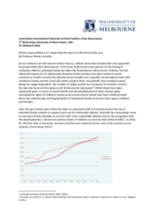Leverhulme International Network on New Families, New Governance 3rd Workshop, University of Notre Dame, USA 27-28 March 2014
In this presentation Professor Connolly reviews recent trends in the use of kinship care in Australia, and highlights that although kinship care has always been a major part of children’s care systems, there has been an important shift over the past twenty years toward the use of extended family systems to support and care for vulnerable children. In 2010, statutory kinship care in Australia overtook foster care as the primary form of alternative care placement.
Professor Connolly discusses the serious gaps in research in that context resulting in policy and practice responses not sufficiently informed by the evidence needed to better inform decision-making. She also highlights what this shift means in the context of a ‘residual’ model of child protection, which Australia and nations with similar social service systems (NZ, UK, US, Canada) have adopted, whereby services for parents and children tend to be provided only when substantial child safety concerns are already present rather than delivering preventive social support services before such concerns become manifest. She suggests that within this residual approach the wholesale movement toward more traditional forms of family support has seen few resources being made available for a sizable population of non-statutory kinship carers and the children they raise. Still fewer resources have been dedicated to the larger population of families where extended family provide essential support functions such as day care, financial assistance, housing and transportation.
Professor Connolly argues that Australia has paid very little attention to the nature and scope of informal kinship care and the interplay between informal and formal support networks needed to strengthen good outcomes for vulnerable children. She suggests a way forward, including a greater emphasis on prevention and initiating programmes of research that would support the development of evidence-informed support services for the large and substantially underserved population of extended family and supportive adult caregivers in Australia. She also calls for the development of multi-level, evidence-based support service specifically geared toward extended family and the unique issues they face, learning from successful interventions such as Triple P. Professor Connolly suggests that what is needed is a reengineering of kinship care support in Australia that goes beyond the current focus on statutory kinship care.
©University of Melbourne

